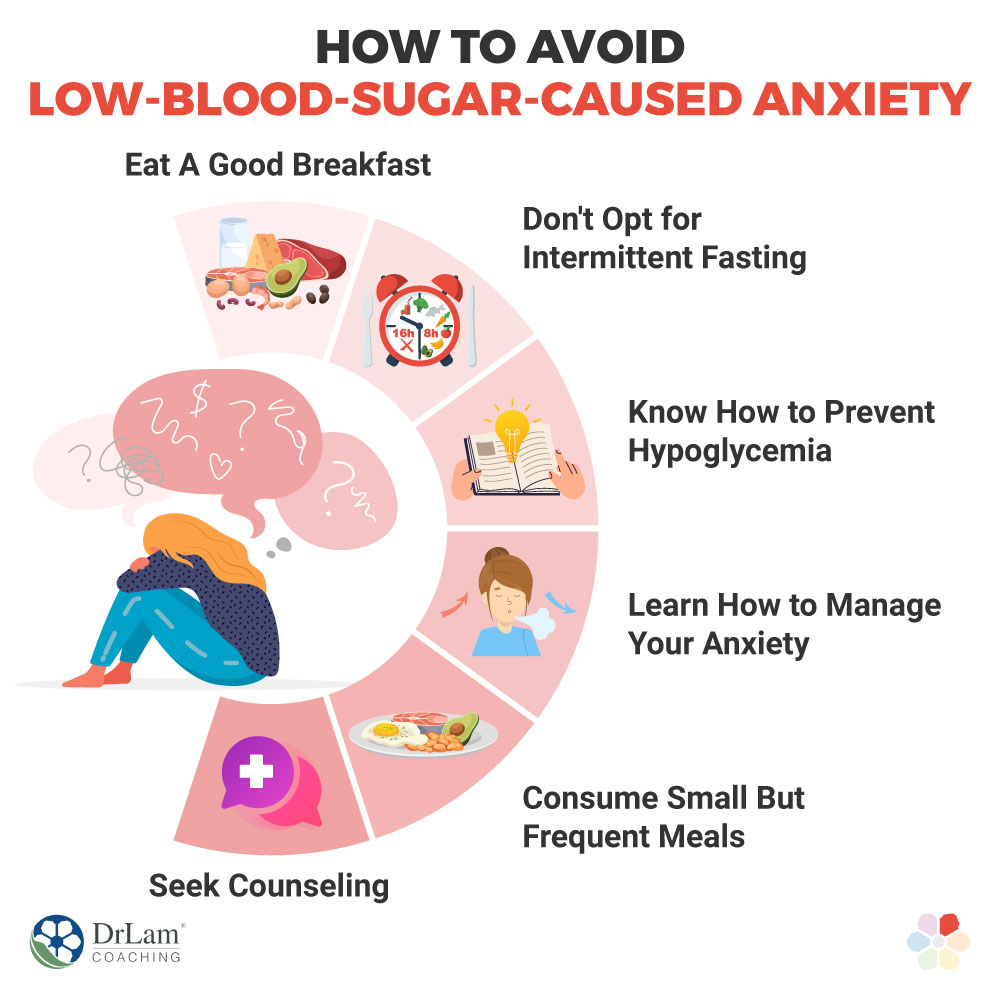 Restlessness, muscle tension, irritability, trouble concentrating and relaxing, continual fears that something bad might happen... All are signs of anxiety. Anxiety is hard to live with, and even harder to prevent. Research has found that in some cases though, low blood sugar causes anxiety. And resolving your symptoms could depend on your ability to keep your blood sugar balanced.
Restlessness, muscle tension, irritability, trouble concentrating and relaxing, continual fears that something bad might happen... All are signs of anxiety. Anxiety is hard to live with, and even harder to prevent. Research has found that in some cases though, low blood sugar causes anxiety. And resolving your symptoms could depend on your ability to keep your blood sugar balanced.
Anxiety can express itself in either physical or emotional ways. Some of the symptoms include:
All of these symptoms can be connected to anxiety, and there are many steps you can take to deal with anxiety. However, if blood sugar is the problem, it may be your diet and eating schedule that needs attention.
Three hormones your body makes work together to keep your body in balance. Among other things, this means keeping your blood sugar levels appropriate for good functioning. These hormones are cortisol, insulin, and thyroid.
They make up the hormones most involved in a part of the NeuroEndoMetabolic (NEM) Stress Response circuit called the Bioenergetics circuit. The NEM consists of six inter-related circuits made up of three organs or systems each that works to keep your body in a state of homeostasis, or balance. So, when stress becomes chronic and severe, regardless of source, the NEM works to counter the stress.
Cortisol, a stress-fighting hormone, comes from your adrenal glands. When you are under stress, your adrenal glands release cortisol to fight the effects of stress. This leads to high levels of cortisol in your bloodstream initially.
And these high cortisol levels lead to increased blood sugar to provide needed fuel for your muscles to fight or flee.
However, if stress becomes chronic, your adrenal glands can become overwhelmed by the demand placed on them for more cortisol. As a result, they can become fatigued and unable to produce and release sufficient cortisol. This initiates a condition called Adrenal Fatigue Syndrome (AFS).
In addition, low cortisol levels lead to mood changes. For example, with low cortisol levels, anxiety can increase.
When cortisol levels drop, the pancreas becomes stimulated to release more insulin into your body. Insulin pushes blood sugar into your cells. So with more insulin in your bloodstream, the level of blood sugar decreases. However, the cells quickly use the sugar, and you are left with low blood sugar.
As a result, you may experience low energy levels and mood swings, including anxiety.
This biochemical plays a role in how low blood sugar causes anxiety, and it increases when stress increases. Epinephrine comes into play when blood sugar falls too low also. Your body uses epinephrine in an effort to bring up blood sugar levels.
However, epinephrine brings on symptoms that mimic symptoms of anxiety. Your heart speeds up significantly, your palms sweat, you get cranky, and anxiety develops. When you combine epinephrine and cortisol, anxiety results.
 The thyroid also responds to changes in cortisol. If your thyroid gland becomes dysfunctional, you can experience low energy, changes in mood, difficulty regulating body temperature, and weight gain. Depression and panic attacks may also result.
The thyroid also responds to changes in cortisol. If your thyroid gland becomes dysfunctional, you can experience low energy, changes in mood, difficulty regulating body temperature, and weight gain. Depression and panic attacks may also result.
From the above, you can better understand how low blood sugar causes anxiety.
Research findings support the possibility that only relative drops in blood sugar can be connected with how low blood sugar causes anxiety. In this research, the definition of relative drops in blood sugar involves glucose levels that significantly affect vulnerable people, but do not fall into the clinical range of hypoglycemia. This research supports the concept of hypoglycemia encountered in AFS. These people experience symptoms of hypoglycemia without clinically low blood sugar.
Scientists found people who fall into this category typically consume a diet high in refined carbohydrates and caffeinated drinks. One of the principal symptoms suffered was anxiety.
Changing the diets of the subjects to include low sugar, low caffeine, and high protein foods resulted in the anxiety symptoms disappearing. So the researchers concluded that balancing blood sugar and insulin led to the disappearance of anxiety symptoms.
In addition, other research shows an increased risk of depression and anxiety associated with the consumption of high glycemic index foods.
Another factor in how low blood sugar causes anxiety involves active diabetes. When you suffer from diabetes, maintaining close control of your blood sugar becomes paramount.
However, this need for close control can lead to a condition called fear of hypoglycemia (FOH). It approaches the level of phobia for many people.
With diabetes, you must learn to balance your food intake with your medications. But if you happen to get into a situation of hypoglycemia, you can experience a wide range of uncomfortable and unpleasant symptoms.
For some people, fear of having a future episode can reach the level of a phobia. You might become hyperaware or overly cautious about checking blood sugar levels. Working to maintain blood sugar levels above the minimum and the worry about this can interfere with all aspects of your life.

Once you determine why low blood sugar causes anxiety in your case, there are some steps you can take to resolve it. These include:
Research and clinical experience show a breakfast high in good fats and protein as soon as possible after getting up will keep you psychophysiologically stable for the rest of the day. And, this proves especially true for people suffering from depression and anxiety. Undertaking a complex task when fasting leads to an over-secretion of insulin which further lowers blood sugar and increases anxiety symptoms.
Many people use intermittent fasting, or eating only during certain times a day, as a way to lose weight. For people vulnerable to anxiety and depression, however, intermittent fasting can make you more vulnerable to sudden mood swings and episodes of anxiety. It's best to avoid intermittent fasting on a daily basis if you fall into this category.
Learn all you can about your risk of becoming hypoglycemic. The more you understand the risk factors and the steps to take if you develop hypoglycemia, the lower your anxiety will become. In addition, enlist family members to become aware of the same things so they can help you if needed.
If you have had episodes of anxiety when out and about, make sure you carry some food with you such as a protein bar or some nuts to help keep your blood sugar balanced. You can also do some adrenal breathing exercises to turn on your parasympathetic response, or "rest and digest" response.
Eating 5-6 small meals during the day might help you sustain your blood sugar levels more. AFS sufferers often find that eating frequent meals helps reduce their hypoglycemia symptoms. Eating the right type of foods also is important in sustaining blood sugar. Focus on foods containing protein and healthy fat, while avoiding sugar, simple carbs like pasta or bread, and caffeine.
 Sometimes, the best way of dealing with anxiety from any source comes through professional counseling. Well-trained professional counselors can use a number of therapeutic interventions to help you rid yourself of anxiety. Likewise, medications can sometimes prove helpful as well.
Sometimes, the best way of dealing with anxiety from any source comes through professional counseling. Well-trained professional counselors can use a number of therapeutic interventions to help you rid yourself of anxiety. Likewise, medications can sometimes prove helpful as well.
If your blood sugar levels fall too low, the symptoms that can develop include anxiety. However, some conditions, like diabetes and AFS, can make maintaining adequate blood sugar levels difficult. Imbalances among cortisol, insulin, and thyroid hormones occur frequently with AFS. This leaves you vulnerable to anxiety.
Here are a few things you can do to alleviate the situation:
If you suffer from AFS, learn to manage your stress level.
Whatever course of action you decide to take, however, please do so with the guidance of your healthcare professional, particularly if you have a health condition like AFS or diabetes.
If you would like to know more about the question of how low blood sugar causes anxiety, the team at Dr. Lam Coaching can help. We offer a free** no-obligation phone consultation at +1 (626) 571-1234 where we will privately discuss your symptoms and various options. You can also send us a question through our Ask The Doctor system by clicking here.
Low blood sugar causes anxiety through the interaction of several hormones in the body. Cortisol, insulin, thyroid hormone, and epinephrine work together to bring on low blood sugar and thus anxiety. The interaction of these hormones can bring on anxiety by itself.
